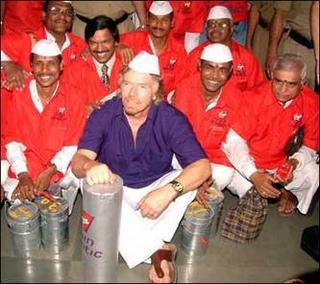Mumbai's dabbawallahas
Mumbai dabbawallahs Dabbawallahs: Mumbai's best managed business
Source :
 Rediff news -http://www.rediff.com/news/2003/nov/04dabba.htm
Rediff news -http://www.rediff.com/news/2003/nov/04dabba.htm (Links open in the same window, right click and use 'Open Link in New Window' to stay on the blog)
Prince Charles is not the first person to show an interest in the dabbawallahs of Mumbai. In fact, the first time they actually shot to international fame was when his compatriots at the BBC did a documentary on them way back in the late 70s.But it was in the 1990s, when management lexicon became a part of daily life, that the interest in Dabbawallahs, now synonymous with Mumbai's blurringly fast life, grew.Today, they are feted regularly and invited to lecture students of business management. Corporate chiefs applaud them, management gurus use them as a models.
So what makes the dabbawallahs so unique? And how do they work? At the simplest, the dabbawallahs deliver home-cooked meals to individuals at their workplaces and return empty tiffin boxes to homes and, in some cases, caterers.For this, they charge Rs 300 to Rs 350, that is $ 6-7, a month.The workforce of the tiffin box suppliers trust, the cooperative body that runs the system, is 5,000. Each tiffin box contains two or three containers, often carrying traditional Indian fare -- rice, curry, chapattis, and vegetables.Housewives even send notes to their hubbies in these boxes.The process begins early in the morning. Cooked food is picked up from houses and caterers by dabbawallahs and taken to the nearest railway station. There, the different tiffin boxes are sorted out for specific destination stations and loaded on to large, rectangular trays accordingly.Each tray can hold up to 40 boxes. These trays then travel in local trains down to variosu stations. At each station, there are another set of dabbawallahs who quickly take the dabbas meant to be distributed in that area and push in dabbas meant for other stations.A Mumbai local halts at a station for about 20 seconds or less and thus, the dabbawallahs have to work with precision and speed. During rush hour, it's a nightmare. Ask anyone who has done time on Mumbai locals.At each station, the boxes are once more sorted for localities and offices and taken there by handcarts or sometimes carried by individuals. The boxes are placed in the offices' reception area by 12.30 pm and are picked up from the same spot by the deliverer a couple of hours later.The whole process then starts again in the reverse. The boxes are picked up from the offices, taken to the nearest station and sorted for their journey home.
Forbes magazine gave this service its highest quality rating of Sigma 6, which means that per million transactions, there is just an error of one.
The service runs every working day. Every day, around 175,000 to 200,000 lunch boxes are delivered. These codes would baffle a cryptographer! But they make perfect sense to the dabbawallahs. The codes and colours indicate the place from where a dabba is collected; the station where it must be unloaded and the office it is to be delivered.The men who form part of the organisation are not employees. These dabbawaallahs have their own trust and each carrier is a trust holder, thus providing valuable insight about 'employee ownership'. On an average, a dabbawallah can make about Rs 3,000 to 5,000. The Trust provides several services to its members, including schools for the children and health care in emergencies.
Their success is linked to the Mumbai suburban train network. On those odd days when the railways ground to a halt, the dabbas are not delivered.But then, if Mumbai's locals aren't running, most Mumbaiites won't reach their offices.
Why have they not tried a similar service in other cities?
Mumbai's geography makes it unique.It is a longish city where residences are in the north and offices in the south, so it makes work simple. A similar service was tried in Delhi a few years ago and it didn't work out; Delhi being a circular city, the logistics are difficult.
As long as the dabbawallah service is there, Mumbaikars alone in the world would have the option of eating homemade food in office without the bother of having to carry a cumbersome lunchbox.
Additional Links
CNN World News article : http://filebox.vt.edu/users/ugandhi/Documents/Mumbai Dabbawallahas-2.pdf
(Links open in the same window, right click and use 'Open Link in New Window' to stay on the blog)
Harvard Business School case : http://harvardbusinessonline.hbsp.harvard.edu/b01/en/common/item_detail.jhtml?i...
(Links open in the same window, right click and use 'Open Link in New Window' to stay on the blog)
Comments